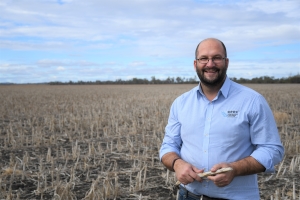What’s new in grains research? Find out at Goondiwindi GRDC Update
What’s new in grains research? Find out at Goondiwindi GRDC Update
Author: Toni Somes | Date: 10 Feb 2020

Future-focused, climate-research will be one of the issues firmly in the spotlight at the 2020 Grains Research and Development Corporation (GRDC) Grains Research Update in Goondiwindi.
Research which suggests wheat yield gains caused by higher carbon dioxide levels may offset losses caused by rising temperatures and reduced rainfall, will be presented by Agriculture Victoria senior scientist Dr Glenn Fitzgerald at the annual Updates on March 3 and 4.
His presentation is based on findings from a long-term study that tested grain production in atmospheric conditions that simulated elevated carbon dioxide environments.
It found that wheat yields increased, by an average of 25 per cent, in a semi-arid environment when carbon dioxide (CO2) was increased from present-day levels of about 400 parts per million to 550ppm – the projected rate in 30 years.
The Australian Grains Free Air CO2 Enrichment (AGFACE) Project was led by Dr Fitzgerald and involved Agriculture Victoria and the University of Melbourne.
“Carbon dioxide is one of the fundamental ‘food sources’ for plants. It affects everything about plant growth and development, as well as plant uptake of nitrogen, water and minerals, so it has a lot of ramifications,” he said.
Dr Fitzgerald will explain the outcomes in more detail as the first speaker on day one of the Goondiwindi event.
Also speaking on increasing climate variability will be Dr Steven Crimp, a climate applications scientist with the Climate Change Institute at the Australian National University.
Dr Crimp said changes in rainfall patterns were less certain, but the forecast was for a decline, which coupled with projected warmer temperatures was likely to increase evaporation.
“Combining, these factors with increasing climate variability will place a significant drag on crop yield despite some offset resulting from more efficient photosynthesis as a result of increased CO2 levels,” Dr Crimp said.
In conjunction with the Goondiwindi GRDC Update this year a new, free session will be held for graduate and early career agronomists.
An initiative of the GRDC the Emerging Agronomists Network session is designed to help agronomists develop their ‘soft skills’ in areas like negotiation, communication with difficult clients and conflict management.
At these sessions experienced agronomists will share their experiences and ‘what they wished they’d known’ at the start of their working life. The session will be held from 5.15-6.15pm on March 3 at Retreat on Rivergums, 37 River Gums Drive. For more information or to RSVP go to www.seedbedmedia.com.au/agronomists.
Other presentations at the Goondiwindi Update include Gerard McMullen, McMullen Consulting, who will discuss maximum residue limits (MRL) in grain and their impact on domestic and international markets, along with potential trade issues.
Dr Christopher Munnings, Senior Research Scientist, CSIRO Energy Technology, will offer insights into new research that allows hydrogen from water to be used as an energy source and the role of ammonia in the process.
Mental health specialist Letitia Cross from the Rural Adversity Mental Health Program will explain tactics and advice for identifying and supporting stressed growers.
The two-day annual event in Goondiwindi includes more than 20 concurrent sessions on important issues impacting on grower profitability – ranging from crop agronomy, nutrition management and pest control through to drought, frost and soil constraints.
GRDC Grower Relations Manager – North, Richard Holzknecht said Update topics were selected by local planning committees and included regionally relevant, rigorously-tested research that was farm-ready and had the potential to bolster growers’ bottom lines.
“The GRDC invests in research on behalf of growers that is designed to deliver real gains to farm profitability and assist in overcoming constraints and positioning the industry well for the future,” Mr Holzknecht said.
“Communicating outcomes from this research, along with innovative developments in agricultural technology and topical issues like climate variability, is a critical part of our role and responsibility to growers, advisers and industry stakeholders.
“The Updates also provide a vital forum for learning, sharing ideas and networking, which helps inform grain growers’ decision-making and improve on-farm profitability.”
The GRDC Grains Research Updates will be held in Queensland and northern New South Wales at:
- Dubbo – February 25 and 26 at Dubbo RSL
- Nyngan – February 27 at Nyngan RSL and Civic Club.
- Goondiwindi – March 3 and 4 at Goondiwindi Community Centre.
- Mungindi – March 5 at Mungindi Hall.
- Bellata – March 13 at Bellata War Memorial Hall.
GRDC Project Code: ICN1906-003SAX,
